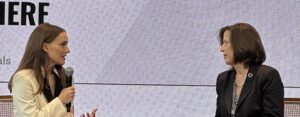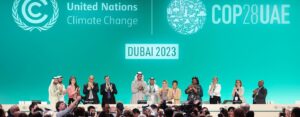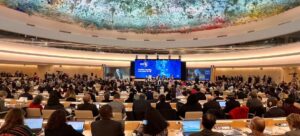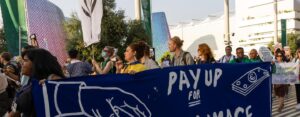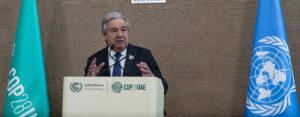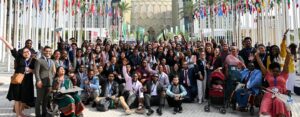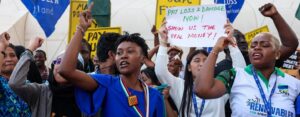Launched in 2015, the initiative set out a 15-year plan to realize 17 interconnected targets, known as the Sustainable Development Goals (SDGs).
Since then, the ambitious goals have shaped national action plans, from building resilient cities and reducing inequalities to taking climate action and forging strong public and private sector partnerships.
This two-part series looks the progress made between 2015 and 2023 in key areas. The first part examines bridging the digital divide, education for all and decent work.
2015: Dawn of the digital divide
When the SDGs were adopted in 2015, the world was already in the midst of a fast-paced digital revolution, with 3.2 billion people using the internet and more than 7 billion mobile phone subscribers, according to the International Telecommunication Union (ITU).
At the same time, the first instances of a digital divide were already taking root. While 80 per cent of households in developed countries had internet access, only 34 per cent of households in developing countries were connected. Least developed countries lagged further behind, with only 7 per cent of households having online access.
For millions of people around the world, a life without digital connectivity is unthinkable, from accessing information to paying for services to getting medical help and studying online.
2023: Digital inequalities starker than ever
With a click of a button, millions of people of all ages around the world engage every single day with digital infrastructure. Yet, digital divides and inequalities are starker than ever. More than two thirds of the planet use the internet, and as of 2022, there were 8.63 billion mobile subscribers.
There was a massive jump in the number of people in least developed countries with access to the internet – 36 per cent of the population, compared to seven per cent in 2015. In comparison, 92 per cent of the population in high-income countries and 79 per cent of the population upper-middle-income countries are connected to the internet.
On a global scale, less women use the internet than men: 63 per cent of women, compared to 69 per cent of men. Meanwhile, new technologies, turbo-charged by risks posed by the increased and unchecked use of artificial intelligence (AI), can easily drive loss of data privacy and escalate risks of online harm, spreading online violence and hate speech along with mis/disinformation.
UN agencies and partners are working hard to address bridge the digital divide led by the UN Secretary-General’s call for developing a global digital compact and the launch of his policy brief on information integrity on digital platforms.

2015: Education, for some
When the SDGs were adopted in 2015, primary school enrolment in developing countries stood at 91 per cent. Still, 59 million children of primary school age remained out of school; about 33 million of these were girls.
Other disparities were striking. In conflict-affected countries, nearly 36 per cent of all children were out of school. About 757 million people globally could neither read nor write, of whom two-thirds were women.
The SDGs represented world leaders’ first attempt to also focus on quality education and learning across levels. With its transformative effect and impact across all other goals, education is a steppingstone for sustainable development and enduring hope for a better future, from the remote archipelagos of the Pacific to the forests of Latin America and islands of the Caribbean, the make-shift classrooms in war-torn Ukraine and refugee camps in northern Kenya.

SDG 4: EDUCATION FOR ALL
- Ensure all children complete free, equitable and quality education and have access to quality early childhood development
- Increase number of young adults with employment skills for
- Eliminate gender disparities and ensure equal access to all levels of education
- Ensure all youth and most adults achieve literacy and numeracy
- Build and upgrade education facilities to be child, disability and gender sensitive
- Increase number of qualified teachers
Without additional measures, 84 million children will be out of school, 300 million students will lack basic numeracy and literacy skills, and only one in six countries will achieve the target of universal secondary school completion.
2023: Half-time report card
While strides have been made, the COVID-19 global pandemic outbreak saw education across the planet take a significant hit. Nearly 1.5 billion children and youth globally were affected by school closures.
Today, globally, some 250 million children are out of school. Of this, about 64 million children of primary school age now remain out of school. Nearly half of all refugee children globally also lack access to education. Globally, 763 million adults are illiterate.
By 2030, it is estimated that nearly 84 million children and young people will still be out of school.
The UN Secretary-General convened the 2022 Transforming Education Summit, which called for more urgent and escalated measures to deliver inclusive and quality education, particularly for girls, low-income students, students with disabilities or in the midst of crisis.

2015: World of work
In 2015, 6.1 per cent of the global population of people of working age were unemployed. This number was higher for women, who were overrepresented in vulnerable and informal jobs and more likely to be unpaid caregivers. In most countries, women employed in full-time jobs earned between 70 and 90 per cent of what men earned.
A total of 1.5 billion people around the world were employed in vulnerable jobs without formal work arrangements, according to the World Employment Social Outlook by the International Labour Organization (ILO).

SDG 8: ENSURE DECENT WORK FOR ALL
- Take immediate measures to eradicate forced labour, modern slavery and human trafficking
- Protect labour rights, and promote safe, secure environments for all workers
- Sustain per capita economic growth and at least seven per cent gross domestic product growth per annum in least developed countries
- Achieve higher levels of economic productivity through diversification, technology and innovation
- Improve global resource efficiency in consumption and production
- Decouple economic growth with environmental degradation
Global unemployment is expected to fall below pre-pandemic levels, although not in low-income countries
2023: Working out post-pandemic progress
Wage losses, job insecurity, and a rising cost of living crisis have been a common thread in the past few years, across the world, directly impacted by the COVID-19 pandemic. The global unemployment rate has overall fallen slightly to 5.8 per cent, but it is still impacted by the pandemic. In 2021, ILO found that an estimated 125 million full-time jobs were lost as a result of the pandemic, which disproportionately affected women and young people.
Last year, more than 2 billion workers globally were employed in the informal sector without social protection coverage, according to the agency’s latest employment outlook report.
In 2021, the UN Secretary-General launched the Global Accelerator on Jobs and Social Protection for Just Transitions, to expand social protection to the four billion people and to create at least 400 million decent jobs. From 2020 to 2022, the Joint SDG Fund’s Portfolio on Integrated Social Protection provided critical financing to sustain and expand social protection coverage in 39 countries around the world, with UN country teams supporting governments in reaching 147 million vulnerable people with access to new or extended social protection benefits.


